 A young Jewish newlywed couple is ready to share some secrets, rules, or even oddities of the traditional Jewish wedding. Some of their traditions are strange for a foreigner, but each custom and each part of the wedding ceremony is well-grounded by their religion and history. And now, let’s get to the “aw’s” and “oh’s”. Because this story is really romantic.
A young Jewish newlywed couple is ready to share some secrets, rules, or even oddities of the traditional Jewish wedding. Some of their traditions are strange for a foreigner, but each custom and each part of the wedding ceremony is well-grounded by their religion and history. And now, let’s get to the “aw’s” and “oh’s”. Because this story is really romantic.
This is the wedding story of Hadassa and Ze'ev, a young Jewish Orthodox couple from Baltimore. In 2 days, they will be married.
The Torah, the Jewish Bible, begins with the letter “Bet” and ends with the letter “Lamed”. Together, they spell “the heart”.
Judaism is practiced by nearly 14.4 million people. More than 2/3 of adult Orthodox Jews are married, compared to about half of other Jewish adults. Orthodox Judaism requires adherence to the ancient laws of the Torah in every aspect of life. It's a concept that may seem old-fashioned to the secular world but here, it's a way of life.
As fresh as homemade challah – a special Jewish bread.
“I'm a person that really likes tradition. I think it gives a lot of clarity and it gives you connection. I think it's very special to do what people did before you”, says Hadassa, bride.
In 2 days, Hadassa is marrying a man she's never held hands with, let alone kissed.
“We started dating this past June (6 weeks ago). Don't freak out, guys. I'm a religious Jew, so I don't really like talk to guys until I'm ready to date”, says Hadassa, bride.
As a big day quickly approaches, Ze'ev makes final preparations.
“Men and women don't really talk too much unless they're dating”, says Ze'ev, groom.
“We only date when we're ready to get married”, says Hadassa, bride.
“I knew from the first date that I wanted to marry her”, explains Ze'ev, groom.
“It was definitely love at first sight, at least for me. You know, he's pretty cute. For most Jewish couples, they don't see each other the week before the wedding. You write notes, you send gifts, but you don't talk”, adds Hadassa, bride.
For Ze'ev and Hadassa, absence makes the heart grow fonder and serves as a final opportunity to work on themselves as individuals.
The tallit is a special prayer shawl, worn by married men during morning prayer. The day before the wedding, Ze'ev's father shows him how to tie it for the first time.
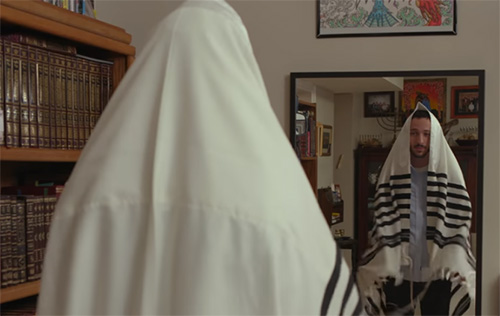
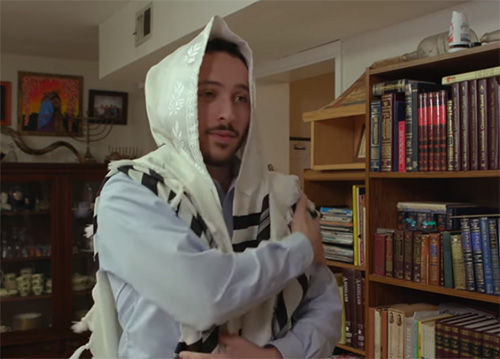
“Dassa is so pure in her love for Hashem, in her love for God. I see that and I want to be more, I want to do better, I want to be a better Jew. She's so great”, says Ze'ev, groom.
According to the Jewish Orthodox faith, a couple's wedding day is one of the holiest days of their lives and they are considered to be closer to God.
Today is Hadassa's own personal Yom Kippur or day of atonement. And she is freed of all transgressions and wrongdoings – something that people in her community are here to honor. Because of her divine status on this day, she bestows and receives blessings from loved ones. It's here that she'll receive Ze'ev and see him for the first time in 7 days.
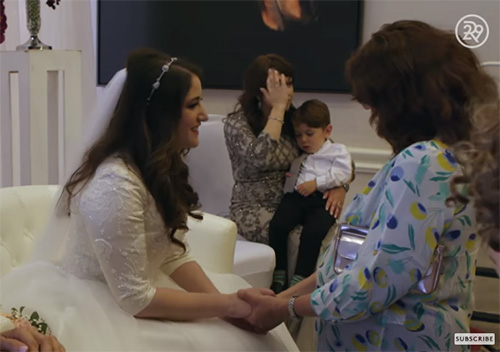
But first, there are a few things he must agree to.
It says in the contract, “I will take care of her. I will support her. All sorts of lovely things”. Oh, but it does not say, “I will do the dishes”!
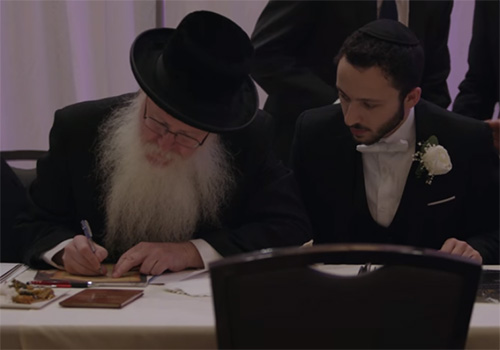
Under Jewish law, the Ketubah solidifies the promise that is making to his future wife. Blade to witness by more experienced generations.
The bride and groom's mother's break a plate to make it legal.
Ze'ev is ready to meet his bride at the Bedeken, a traditional veiling ceremony.
Ze'ev veils Hadassa as a sign of respect to her modesty and privacy during this holy time. He offers her a blessing and his heart.
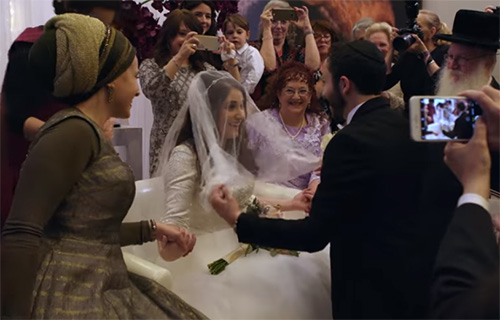
The wedding ceremony begins under the Chuppah, a marriage canopy which symbolizes the home they will grow together. The bride encircles the groom 7 times to break down any walls or barriers between them.
A shared sip of wine and a ring join them together. A broken glass seals the deal.
“When I get to hold my wife's hand for the first time, I will be jumping for joy”, smiles Ze'ev, groom.
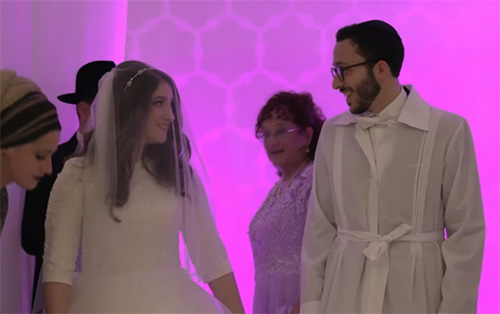
Surrounded by their friends, family, and God, Hadassa and Ze'ev are married at last. And finally, they can have some alone time. Behind closed doors, Hadassa and Ze'ev spend their first 15 minutes alone in a Yichud or seclusion room – an act that symbolizes their newly married state.
Although men and women dance separately to avoid touching the opposite gender, it's a requirement for all to bring joy to the bride and groom. A commandment, the guests take very seriously.
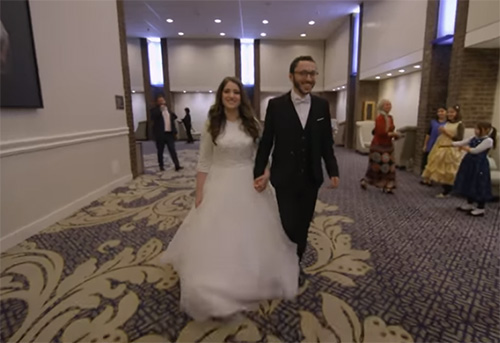
After today, Hadassa and Ze'ev will have a special place in the community. What lies ahead is a series of firsts and they will rely on their faith to guide them.
(c)

